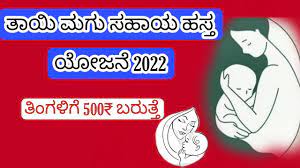Step 2.3 Thayi Magu Sahaya Hastha
Thayi Magu Sahaya Hastha offers registered construction workers and their children support for a duration of three years, starting from the child's delivery date, providing pre-school education and nutritional assistance.
What are the workers entitled to?
A registered female construction worker is entitled to receive support, including early childhood education and nutritional assistance for her child.
The worker can avail an amount of INR 6000/- (at the rate of 500 per month) twice, specifically for the birth of the first two children.
This support extends for a period of three years, starting from the child's date of birth.
The main goal is to support women in the construction sector by ensuring their children receive early education and proper nutrition during crucial developmental stages.
A woman should be registered construction worker under BoCW
Applications can be submitted within six months of delivery.
Each registered female construction worker is eligible to avail this facility twice, specifically for the birth of their first two children, with only two live births allowed.
Please note Miscarriages are counted as live births
A total of Rs. 6000/- (equivalent to 500 rupees per month) will be provided to the registered female construction worker.
What are the eligibility criteria for accessing benefits from Thayi Magu Sahaya Hastha scheme?
- All registered female construction workers with a valid labor card are eligible for the Thayi Magu Sahaya Hastha scheme.
Wife of a construction worker is not eligible for this benefit.
What type of documents required for application?
- Application in Form XVII-A
- An Affidavit stating that the claim for second delivery
- Proof of Bank Account
- Photo of Child
- Employment Certificate
- Proof of Identity/Smart card issued by the Board (Attested)
- Discharge Summary
- Birth Certificate of Child
- Application can be submitted within 6 months of delivery
- Application can be submitted every year (up to three years)
- Child living Affidavit shall be submitted for second and third year
- and can submit their applications through the Board's software.
What is the procedure to apply?
Applicant needs to submit the application via the Seva Sindhu portal.
- The applicant is required to complete and submit the application.
- The application will go through processing and verification conducted by a Senior/Labour Inspector.
- Subsequently, the application will be subject to review and approval by a Labor Officer.
Every application shall be accompanied by Birth Certificate of the Child obtained from the Registrar of Birth and Deaths
Common reasons why construction workers fail to receive the benefits under BoCW schemes
Exclusion owing to policy design
- Program only for women with individual cards.
- Some female migrants lack official birth documents, making them ineligible.
- Child living affidavit needed for second and third years, obtaining a lawyer's affidavit for a second child can be challenging and costly.
- Applications can be submitted within six months of delivery.
- Miscarriages counted as live births, only two live births allowed.
- Pregnant women ineligible if they haven't worked for 90 days before delivery.
Minimum one-year waiting period for maternity benefit eligibility.
Wives of construction workers are not eligible.
Exclusion owing to lack of supporting documentation
- A ration card is a mandatory document.
- If a woman relocates after marriage, an Aadhaar address change is required, even if it's within Bangalore.
- Employment Certificate needed
- Birth certificate required for the child; in cases of home delivery, obtaining a discharge slip is challenging, leading to difficulties in obtaining the birth certificate.
- Applications can be submitted every year, for up to three years
Exclusion owing to eligibility conditions
- To qualify for this program, women must be registered as construction workers.
- It is available exclusively to vulnerable households, and therefore, possession of a ration card is mandatory.
Exclusion owing to renewal related process
- The program spans three years and is renewable annually, but knowledge gaps can hinder the renewal process after the first year.

